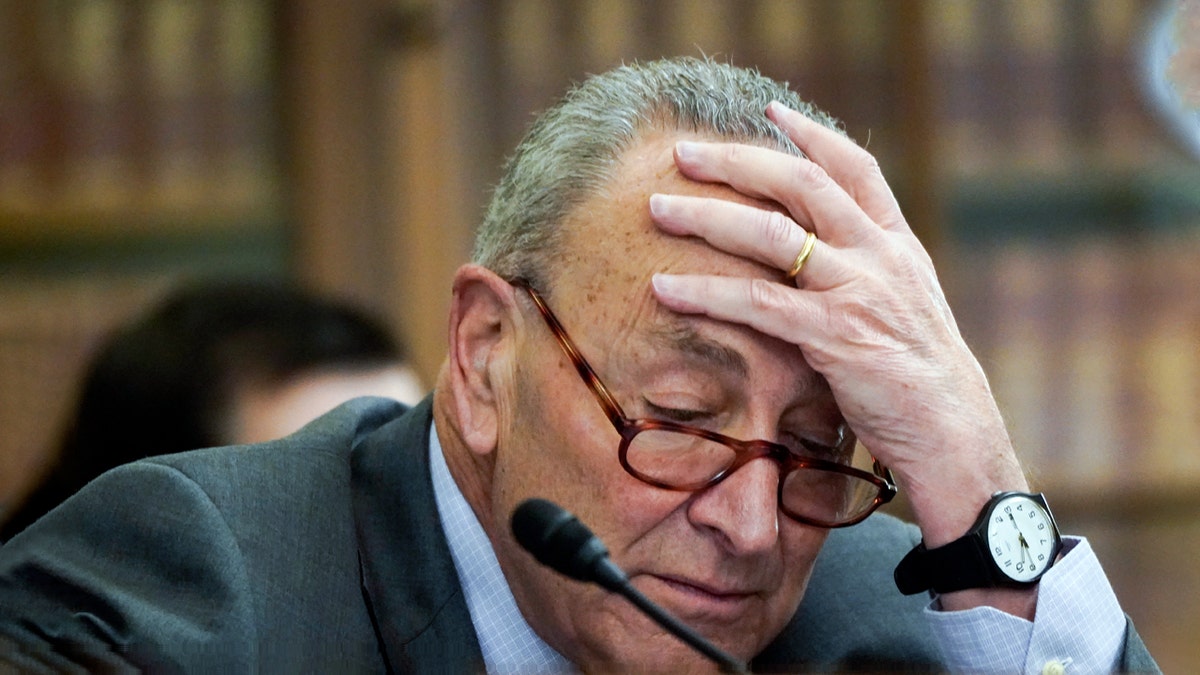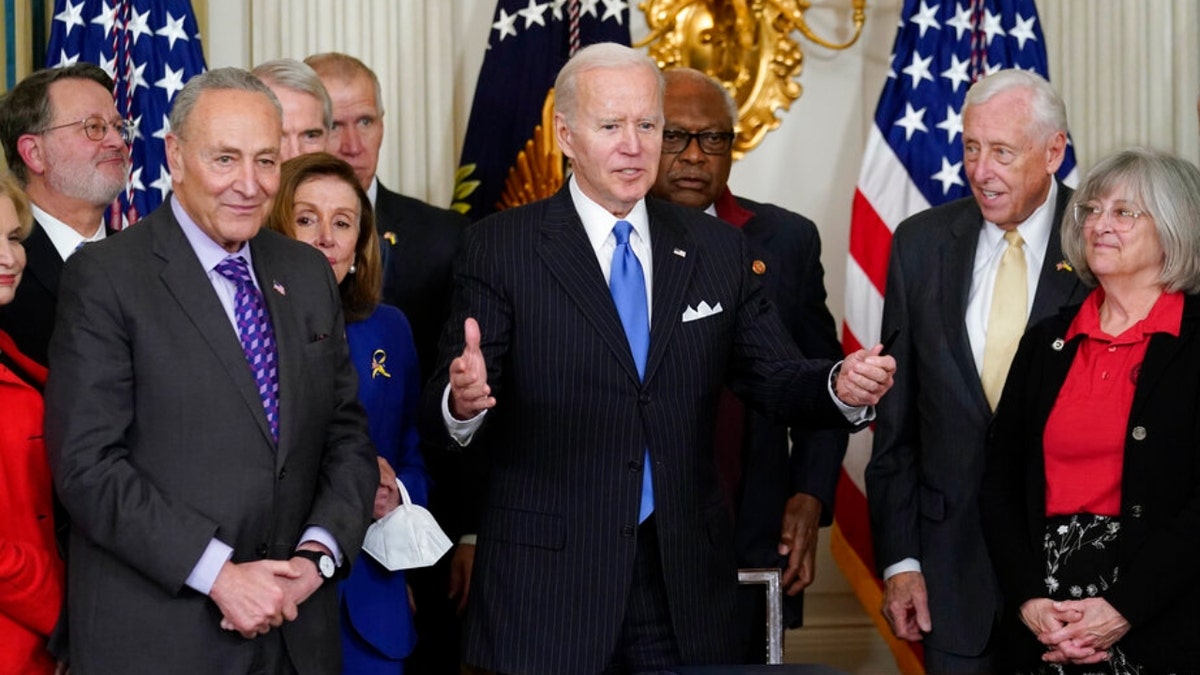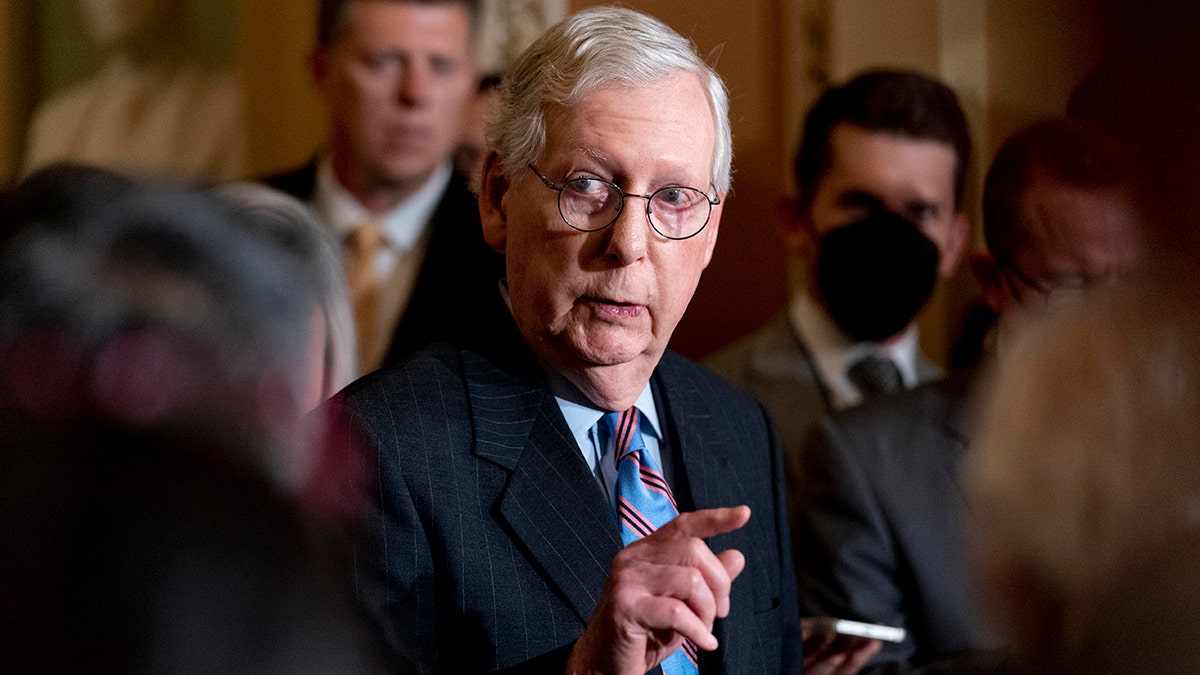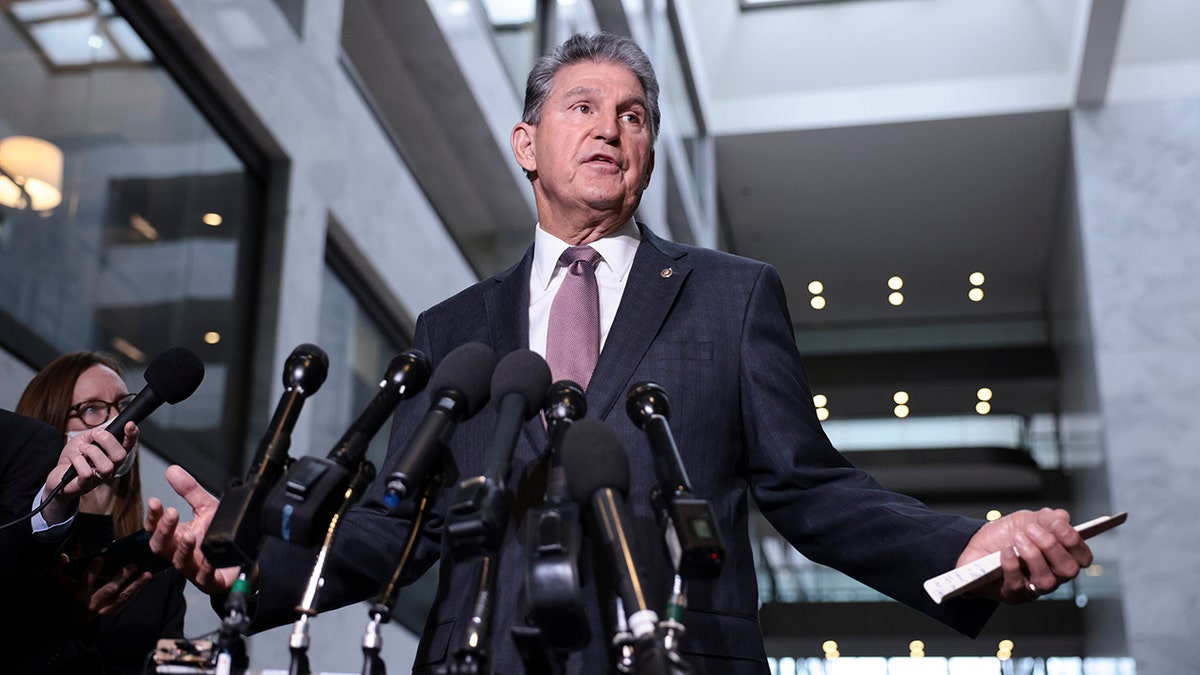Bartiromo: There's no evidence that inflation has reached its peak
FOX Business host Maria Bartiromo predicts the Federal Reserve will announce a 75-basis-point interest rate hike at the end of July and argues the U.S. is already in a recession.
Excuse me if you’ve heard this one before.
Dig deep back into the recesses of your memory to summon the massive, internal policy fight among Democrats last year to pass a more than $4 trillion social spending package. The measure was a catch-all. It would expand access to health care. Included cost reductions for pharmaceuticals. Address climate change. Provide education assistance.
The breadth of the bill was exhaustive, and progressives still wanted a larger bill. But Democratic leaders were finally able to whittle it down to $2 trillion, chipping away at the price of the package even more — dropping it under $2 trillion.
And then Sen. Joe Manchin, D-W.V., killed the measure last December.

Senate Majority Leader Chuck Schumer of N.Y., is having difficulty convincing Senator Manchin to side with the democrats on a social spending bill, yet again. (Elizabeth Frantz/Pool via AP)
Manchin had been skeptical of the plan from the beginning. Democrats wanted an expansive bill — which was probably out of alignment with their parliamentary majority. In a 50/50 Senate, Democrats needed everyone on board so Vice President Kamala Harris could break the tie. And, Democrats hoped to use a special budget process known as "reconciliation" to avoid a filibuster to pass the bill.
SCHUMER PREPS FINAL SHOT AT PASSING RECONCILIATION BILL AS SUMMER SESSION KICKS OFF
But the gig was up once Manchin flagged the bill.
So here we go again.
Manchin has negotiated privately for months with Senate Majority Leader Chuck Schumer, D-N.Y. Democrats hoped they could get an evaluation of the bill from Senate Parliamentarian Elizabeth MacDonough in the coming days to see if it complied with strict budget reconciliation rules. "Reconciliation" bills must be fiscal in nature, not policy based. And, they can’t add to the deficit over a ten-year window.
Manchin said for months that his goals in a reconciliation package were deficit reduction (which is part of what’s supposed to happen in a reconciliation measure anyway) and efforts to reduce the price of prescription pharmaceuticals. There will likely be a few environmental policies in such a package — but just a sliver of what the left demanded in the Green New Deal.
Liberals balked at scaling down the plan a few months ago. But now, progressives have no other option.

President Joe Biden gestures after signing the Postal Service Reform Act of 2022 in the State Dining Room at the White House (AP Photo/Susan Walsh)
"Progressives have been mugged by reality," said Darrell West of the Brookings Institution. "They know that the margin is so narrow that if they lose one Democratic senator, nothing is going to happen. So they have dramatically lowered their expectations in every area on guns, on abortion and on budget matters. So they're facing the political reality. They just simply don't have the votes to do all the things they would like to do."
And that’s what infuriated progressives last year. At one point, members of the House Progressive Caucus threatened to withhold their support for a bipartisan infrastructure bill unless the House moved Build Back Better in tandem. That consternation bled from the summer into the early fall. President Biden visited with House Democrats on two separate occasions, leaving the Capitol on both occasions empty-handed.
The House finally approved the infrastructure measure in the autumn, months after the Senate tackled the package.
And then, Manchin put the kibosh on Build Back Better, just before Christmas.
Democrats are dubious about whether they can advance the package this time around – after so many stunted efforts over the past year. Senate Majority Whip Dick Durbin, D-Ill., said there’s still "a chance" of moving things. In fact, Durbin hinted that doubts could motivate his colleagues to actually forge a deal.

Senate Minority Leader Mitch McConnell, R-Ky., said "democrats are unifying the country in unhappiness on a dark path down which they're taken our economy," in response to the bill. (AP Photo/Andrew Harnik)
Senate Minority Leader Mitch McConnell, R-Ky., is now threatening to blow up a bipartisan "competitiveness" bill to help the U.S. compete with China on microchips — if Democrats use budget reconciliation. McConnell is always searching for leverage. Even so, McConnell could portray the Democrats’ latest mulligan on Build Back Better as another round of "unnecessary" spending — just before the midterms.
McConnell and his fellow Republicans have hammered Democrats for advancing their own, $1.9 trillion COVID bill in March of 2021. They contend that adoption of that plan hamstrung the U.S. economy.
"Democrats are unifying the country in unhappiness on a dark path down which they’ve taken our economy," observed McConnell.
And then McConnell took a direct swipe at Manchin — who is negotiating the latest Build Back Better incarnation.
"Our colleagues are reportedly cooking up a trillion dollars in massive tax hikes," said McConnell. "I don’t know many Kentuckians who think Americans need fewer small business jobs or less American energy. I’m not certain about the good people of West Virginia, either."
Opposing the spending plan is a lay-up for Republicans ahead of the election. They’ve hammered Democrats for a year-and-a-half on spending. A eye-popping inflation report only fuels the GOP narrative. The consumer price index leaped 9.1%over the past year — a 40-year record. Energy costs soared nearly 42%. Gasoline surged almost 60%. Eggs are one third more expensive than they were a year ago. Airline fares spiked 43.1%. And, men may try to convince their bosses that it’s time to work from home again. The cost of men’s suits jumped a whopping 25% over a year ago.
It’s unclear yet if Democrats will succumb to the bad news from the inflation report. But resolving anything on a domestic spending package remains aspirational for now. And even if Democrats fail to advance the plan, they can tell voters they tried — and convert yet another misfire into a campaign issue. Translated: give us a few more Democratic senators in the midterms and we won’t be at the beck and call of Joe Manchin.
"Democrats understand they're in a very rough political situation. There's not a lot they're going to be able to pass, but they still want to act like they are fighting for the causes that their base cares about," said West.
But talks continue. Democrats would love to move this package before the August recess. The "technical" deadline is Sept. 30, the end of the government’s fiscal year. That date is important because Democrats would use a budget reconciliation package to pass the plan.
Some in budget circles assert that Democrats must adhere to the confines of the fiscal year to advance a measure under the reconciliation guise. But that timing is far from clear. Fox was told that no one has ever challenged that argument, so it’s possible any movement could slip deeper into the fall past September.
But here’s the rub.
We got a signal from Manchin this week about where he might stand on another social spending package. In a statement, the West Virginia Democrat seemingly torched a possible bill because of the inflation spike.

Every bill must go through Sen. Joe Manchin (D-WV), essentially. (Anna Moneymaker/Getty Images)
"No matter what spending aspirations some in Congress may have, it is clear to anyone who visits a grocery store or a gas station that we cannot add any more fuel to this inflation fire," said Manchin.
Some Democrats think that Manchin is toying with Democrats again. For Schumer’s part, he must show Democratic voters he’s doing all he can to secure an agreement.
But, by the same token, one senior Democratic source suggested to Fox that Schumer is using Manchin as a foil.
Any possible bill must go through Manchin., soSchumer will naturally work with him.
But if Manchin backs away from the table — which he all but did this week — Schumer doesn’t even have to do anything. One theory goes that Schumer played Manchin against himself. It was always a longshot to get any version of Build Back Better. So if they get a deal, great. If not, liberals will blame Manchin, just as they did last summer, last fall and in December when Manchin finally nuked the deal in an interview with Bret Baier on "Fox News Sunday."
CLICK HERE TO GET THE FOX NEWS APP
On its face, this appears as though Schumer will have failed to bring Manchin into the fold. Perhaps. Schumer and Democrats may have lost this battle, but could well win the war.
They can use an impasse on even a modest version of Build Back Better as another reason to campaign for two to three more Senate Democratic seats this fall. Failure here again implies that Democrats must go through Manchin on everything. And Democrats hope this concept resonates with voters — if they elect more Democrats next year and minimize Manchin.





